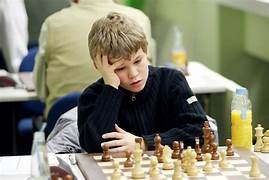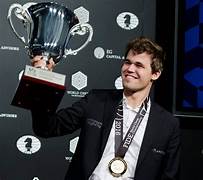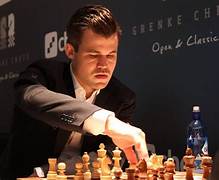|
|
|
|
|
Introduction
Magnus Carlsen, often dubbed the "Mozart of Chess," has redefined the landscape of modern chess with his unparalleled talent and strategic prowess. Born in Norway, Carlsen's meteoric rise to the top has made him one of the greatest chess players of all time. This blog explores his early life, remarkable achievements, and his enduring impact on the world of chess.
Early Life and Introduction to Chess
Sven Magnus Øen Carlsen was born on November 30, 1990, in Tønsberg, Norway. From a young age, Carlsen displayed an exceptional aptitude for intellectual challenges. Encouraged by his father, Henrik, Magnus began playing chess at the age of five. His passion for the game quickly became evident as he spent hours studying chess books and practicing his skills.
Carlsen's talent was undeniable. By the age of eight, he was competing in local and national tournaments, often outperforming players much older than himself. His early exposure to competitive chess laid the foundation for his future success.
Rising Star
Carlsen's ascent in the chess world was nothing short of spectacular. At the age of 13, he became the youngest Grandmaster in the world in 2004. This achievement garnered international attention and marked the beginning of Carlsen's journey to chess stardom. His aggressive playing style, combined with a deep understanding of chess theory, set him apart from his peers.
Breaking Records and Achieving Milestones
Carlsen's career is marked by numerous records and milestones. In 2010, he became the youngest player to be ranked world No. 1 at the age of 19. His consistent performance in top-tier tournaments solidified his reputation as a formidable player. Carlsen's ability to adapt to different playing styles and his exceptional endgame skills earned him widespread acclaim.
In 2013, Carlsen won the World Chess Championship, defeating Viswanathan Anand. This victory made him the second youngest World Chess Champion in history, after Garry Kasparov. Carlsen's reign as World Champion has been characterized by his dominance in classical, rapid, and blitz formats, showcasing his versatility and comprehensive understanding of the game.
The Magnus Carlsen Effect.
Carlsen's impact on the chess world extends beyond his titles and victories. His dynamic playing style and innovative strategies have influenced a generation of chess players. Known for his deep calculations and positional understanding, Carlsen's games are studied extensively by both amateurs and professionals. His success has also brought renewed interest and popularity to chess globally, inspiring many young players to take up the game.
Iconic Matches and Rivalries
Throughout his career, Carlsen has faced and defeated some of the strongest players in the world. His rivalries with players like Viswanathan Anand, Fabiano Caruana, and Ian Nepomniachtchi have produced some of the most memorable matches in recent chess history. The 2018 World Chess Championship against Caruana, held in London, was particularly notable. The match ended in a tie in the classical format, leading to rapid tiebreaks, where Carlsen emerged victorious.
Beyond the Chessboard
Magnus Carlsen's influence is not limited to his performance on the chessboard. He has ventured into various projects aimed at promoting and popularizing chess. In 2013, he launched the Play Magnus app, which allows users to play against a virtual version of Carlsen at different ages. This innovative approach has made chess more accessible and engaging for people around the world.
Carlsen has also been involved in organizing and promoting online chess tournaments, especially during the COVID-19 pandemic. His involvement in platforms like Chess24 and the creation of the Magnus Carlsen Invitational have provided high-quality content and competitive opportunities for players and fans alike.
Personal Traits and Philosophy
Carlsen's success can be attributed to his unique approach to chess and his personal traits. Known for his calm demeanor and resilience, Carlsen's psychological strength has often given him an edge over his opponents. He has a deep respect for the history of chess and its legendary players, which is reflected in his strategic approach to the game.
Carlsen's philosophy emphasizes the importance of continuous learning and adaptation. He is known for his rigorous training regimen and his ability to stay ahead of his competition through constant study and practice. His dedication to self-improvement and his love for the game have been key factors in his sustained success.
Awards and Recognition
Magnus Carlsen's achievements have been recognized with numerous awards and honors. He has received the Chess Oscar multiple times and has been named Norway's Sportsperson of the Year. His contributions to chess and his impact on its popularity have earned him a place among the greatest chess players in history.
The Future of Chess with Carlsen
As Magnus Carlsen continues to compete and innovate, the future of chess looks bright. His ongoing involvement in promoting the game, coupled with his exceptional skill, ensures that chess will remain a dynamic and evolving sport. Carlsen's influence on the next generation of players is undeniable, and his legacy will continue to shape the world of chess for years to come.
Conclusion
Magnus Carlsen's journey from a young chess prodigy to a world champion and global icon is a story of brilliance, perseverance, and passion. His contributions to chess, both on and off the board, have left an indelible mark on the game. Carlsen's legacy is a testament to the enduring appeal of chess and the endless possibilities it offers to those who dare to dream and strive for excellence.



